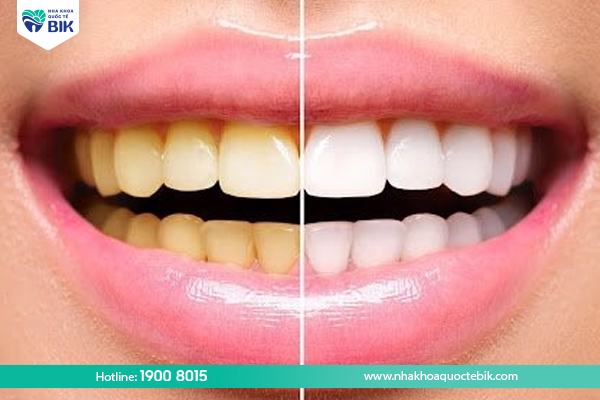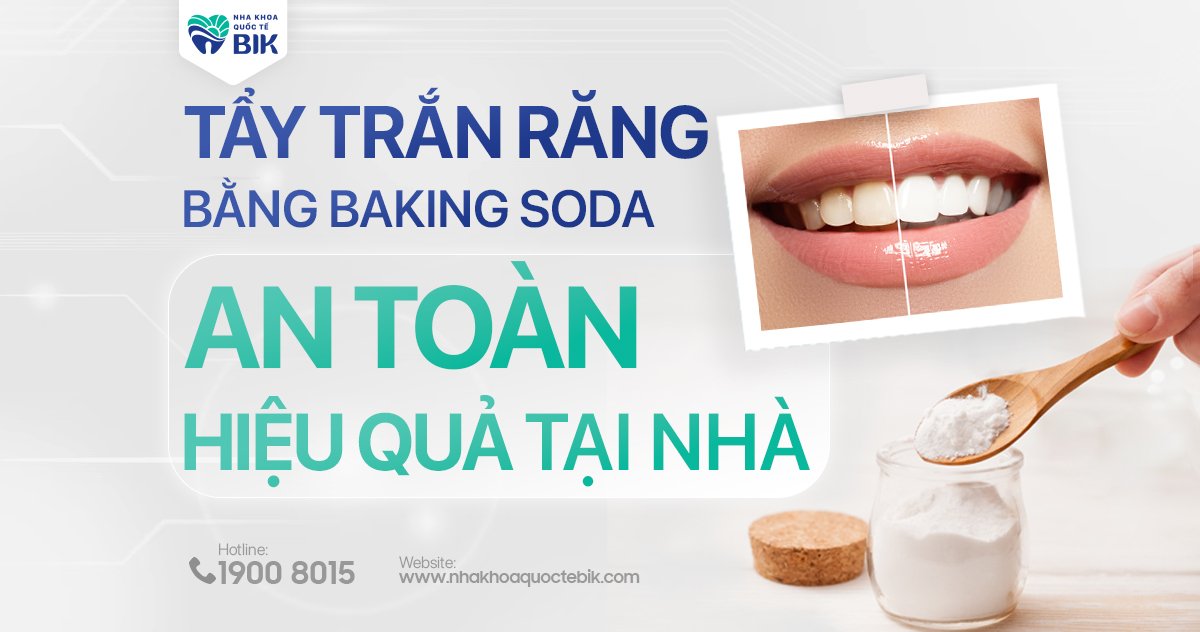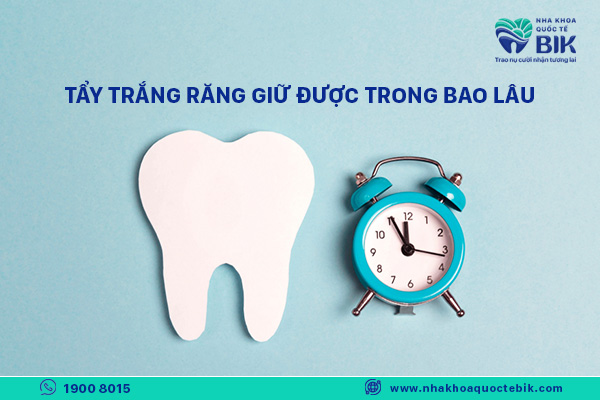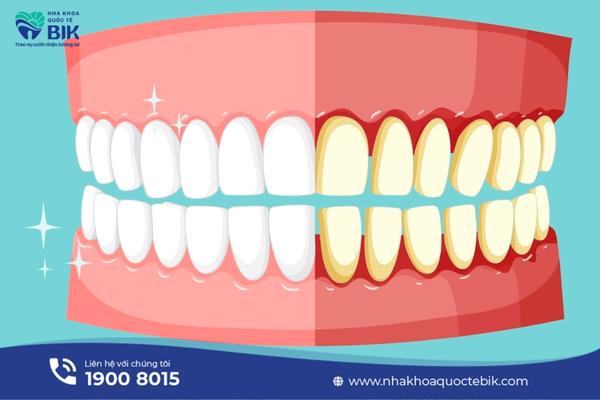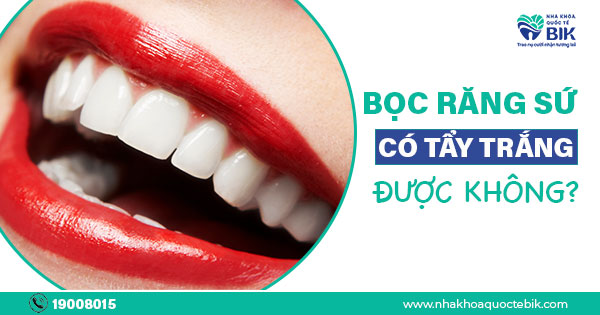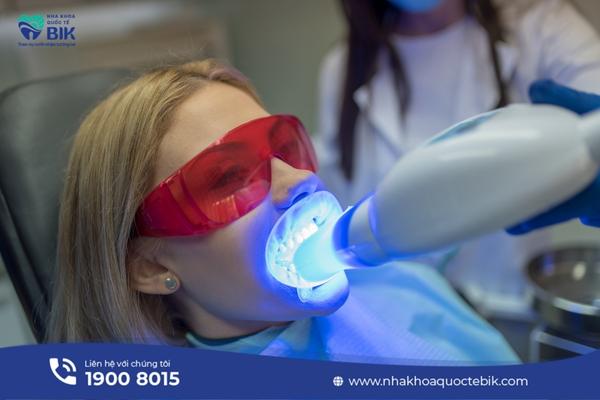Teeth whitening is a highly effective method for those who want to have a confident smile. However, is teeth whitening harmful? Should you whiten your teeth? Before whitening your teeth, you should learn carefully about this method!
1. Why do you need to whiten your teeth? What causes tooth discoloration?
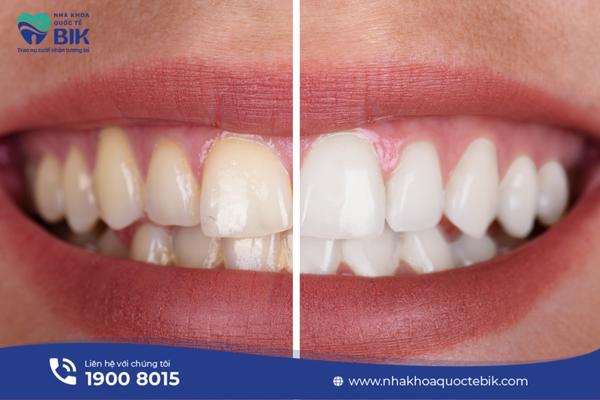
Teeth are very susceptible to discoloration due to our daily food and drinks. Brushing only cleans plaque on teeth but does not whiten teeth, so you need to whiten your teeth to have bright, even-colored teeth, bringing a more confident smile. At the same time, it also eliminates bad breath caused by yellow plaque.
There are 2 main groups of causes of tooth discoloration:
a. Tooth surface discoloration
– Using colored foods such as chocolate, tea, coffee, soft drinks, etc. erodes tooth enamel, causing tooth discoloration.
– Smoking for many years.
– Poor oral hygiene creates conditions for leftover food and bacteria to stick to tooth enamel, causing teeth to become darker.
– Mouthwash: Using mouthwash containing Chlorhexidine, Hexetidine for a long time causes tooth discoloration.
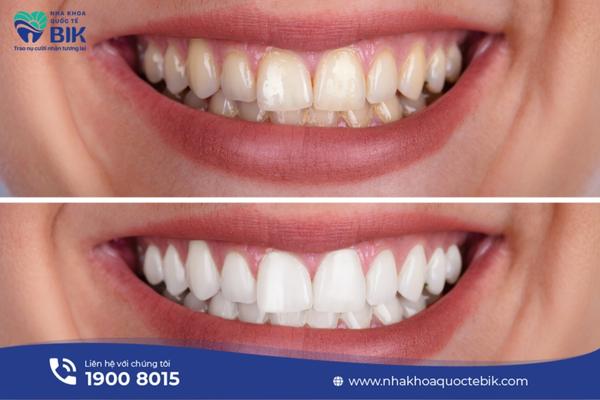
b. Discoloration inside the tooth structure
– Old age: Over time, the outer layer of tooth enamel gradually wears away, combined with foods containing color, making tooth discoloration worse.
– Genetics: The thinner the tooth enamel, the more visible the yellow dentin inside, and the thickness of this enamel layer depends on genetics.
– Using Tetracycline antibiotics: The active ingredients in Tetracycline antibiotics diffuse into the newly formed calcified tissue, causing the salts of the color element to penetrate the dentin, causing tooth discoloration.
– Excess fluoride: Using water sources with high concentrations of fluoride, using too much fluoride toothpaste can affect the tooth structure, causing tooth discoloration.
2. Should I whiten my teeth?
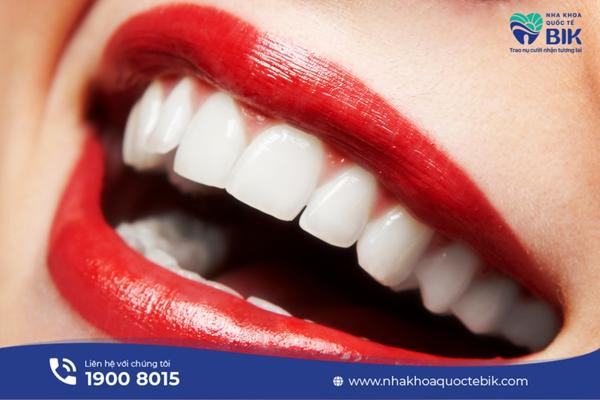
Having white teeth helps you feel more confident in communication, bringing many advantages in studying, working as well as daily life. When you see signs of yellow, dull teeth caused by improper hygiene, eating foods that are harmful to teeth, teeth stained by plaque, etc., you should whiten them. Here are the benefits of teeth whitening:
Teeth whitening helps you feel more confident in communication
External factors such as colored foods and drinks, frequent smoking habits, etc. can cause teeth to become discolored and lose their aesthetic value. Therefore, teeth whitening is a safe cosmetic method to help your teeth become whiter, you will have a more beautiful smile, and be confident when communicating with friends, partners and people around you.
Remove plaque, bacteria, make teeth stronger
Teeth whitening helps remove stubborn deposits on tooth enamel, repel harmful bacteria, prevent tooth decay and tartar effectively, contributing to improving oral health very well.

However, whether teeth whitening is effective or not will depend on your oral health.
The following cases should perform teeth whitening:
– Patient’s tooth enamel still healthy, no or little wear.
– The patient’s oral condition is good.
– People over 18 years old and have a complete jaw bone structure, no change.
– People who are not too old and do not have chronic diseases that affect their health.
You should only perform teeth whitening when prescribed by a specialist. In case you are experiencing dental diseases, you should complete treatment before performing whitening methods to ensure the safety of your teeth.
3. Is teeth whitening harmful? Cases where teeth whitening is not recommended
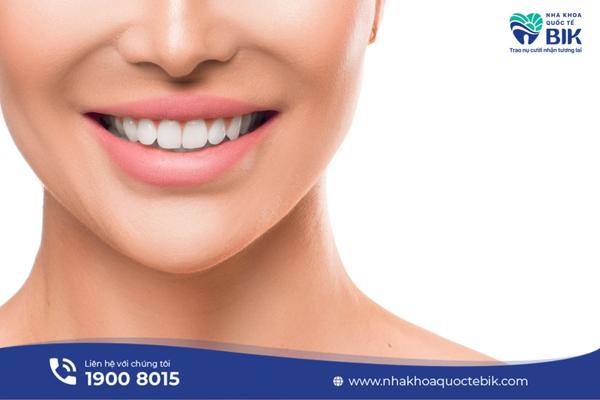
According to the British Dental Association (BDA), clinical studies have concluded that teeth whitening technology is completely harmless, safe for oral health, does not damage tooth enamel, and does not change the tooth structure if performed correctly.
In fact, about 60% of cases feel sensitive after teeth whitening. However, this is a normal symptom, because the tooth surface has just been stimulated to remove dirt and plaque, so it is inevitable that there will be a slight feeling of sensitivity. After a few days, the pain will disappear.
If teeth whitening is not done properly, teeth whitening is overused, bleaching is used with poor quality, etc., it can cause many complications affecting the oral cavity.
– The enamel layer is worn away, causing tooth sensitivity.
– Gums are damaged, which can lead to serious oral diseases.
– May cause allergies when using inappropriate whitening agents.
To ensure the teeth whitening process is safe and achieves the best results, you should go to reputable dental clinics, use genuine whitening agents, with clear origins, and modern equipment and technology.
Cases where teeth whitening is not recommended
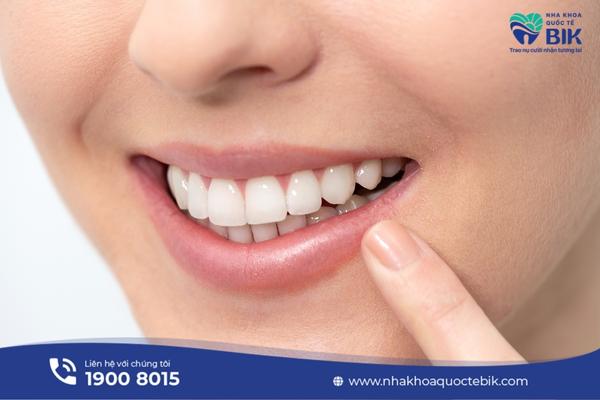
– Pregnant and lactating women, because some active ingredients in teeth whitening agents will affect the health of infants and young children.
– People under 16 years old because their teeth are still in the process of completion.
– People with periodontitis, tooth decay, exposed tooth necks, … and people who show signs of allergy to teeth whitening agents.
– Dentures, removable porcelain teeth: Teeth whitening will not be effective in this case. Because whitening agents are only effective on real tooth enamel
4. Notes when whitening teeth
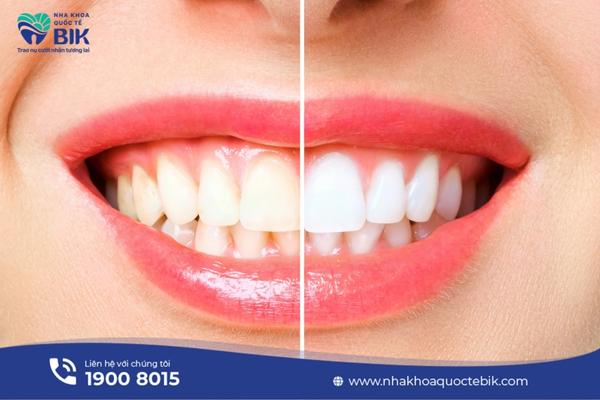
Although teeth whitening is a fairly simple technique in dentistry, it does not pose a danger to your teeth or health. However, you also need to pay attention to the following issues before bleaching to achieve the best results.
a. Before bleaching teeth
Before bleaching teeth, you need to remove tartar, brush away colored plaque, restore worn tooth necks, and treat tooth sensitivity if teeth are too sensitive.
c. Care after bleaching teeth
You should start drinking water at least 3 hours after teeth whitening. After bleaching for 1-2 weeks, you should avoid colored foods and drinks, avoid drinking water that is too hot or too cold.
Brush your teeth properly, after eating or at least 2 times/day, in addition, you should use dental floss to remove food from between your teeth after eating.
You should rinse your mouth with saline in the evening to prevent bacteria from attacking.
Have a dental check-up every 6-12 months for a general check-up and tooth color assessment. If necessary, you may need to maintain teeth whitening.
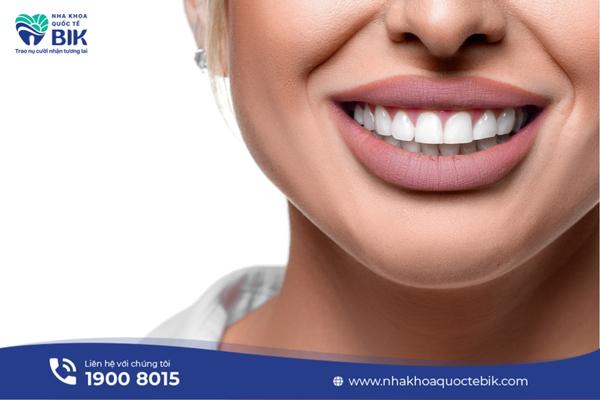
d. In case of severe tooth discoloration
In case of severe tooth discoloration, you can combine both in-office teeth whitening and home trays to achieve the desired effect.
e. Teeth whitening many times will be harmful
Frequent teeth whitening can cause prolonged tooth sensitivity and weaken your teeth. It is best to whiten your teeth 1-2 times/year as directed by your dentist.
f. Choosing a dental clinic for teeth whitening
Currently, teeth whitening is widely performed at many facilities that are not fully equipped and doctors do not provide clear advice. Therefore, to bring optimal treatment results, safe for oral health, you need to find a reliable dental center with a team of highly skilled doctors and modern machinery to serve the treatment and examination process well.
Thanks to the development of modern technology, teeth whitening seems to have become very simple and fast. If you are qualified and your teeth do not have pathological conditions such as tooth decay, gingivitis, periodontitis… then you should go for teeth whitening to have the beautiful teeth as desired.


